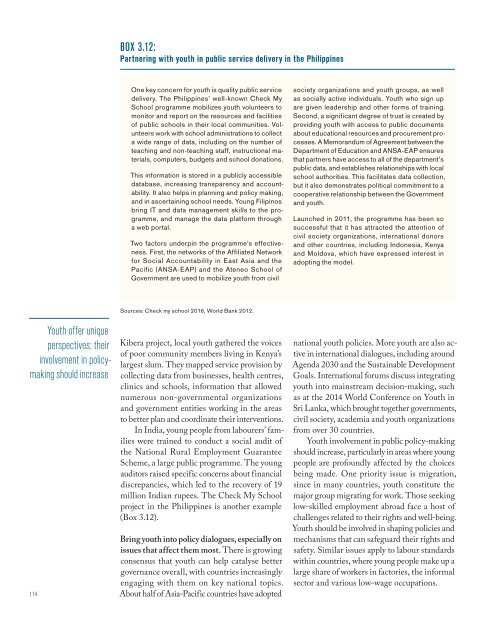SHAPING THE FUTURE HOW CHANGING DEMOGRAPHICS CAN POWER HUMAN DEVELOPMENT
1VPo4Vw
1VPo4Vw
You also want an ePaper? Increase the reach of your titles
YUMPU automatically turns print PDFs into web optimized ePapers that Google loves.
BOX 3.12:<br />
Partnering with youth in public service delivery in the Philippines<br />
One key concern for youth is quality public service<br />
delivery. The Philippines’ well-known Check My<br />
School programme mobilizes youth volunteers to<br />
monitor and report on the resources and facilities<br />
of public schools in their local communities. Volunteers<br />
work with school administrations to collect<br />
a wide range of data, including on the number of<br />
teaching and non-teaching staff, instructional materials,<br />
computers, budgets and school donations.<br />
This information is stored in a publicly accessible<br />
database, increasing transparency and accountability.<br />
It also helps in planning and policy making,<br />
and in ascertaining school needs. Young Filipinos<br />
bring IT and data management skills to the programme,<br />
and manage the data platform through<br />
a web portal.<br />
Two factors underpin the programme’s effectiveness.<br />
First, the networks of the Affiliated Network<br />
for Social Accountability in East Asia and the<br />
Pacific (ANSA-EAP) and the Ateneo School of<br />
Government are used to mobilize youth from civil<br />
society organizations and youth groups, as well<br />
as socially active individuals. Youth who sign up<br />
are given leadership and other forms of training.<br />
Second, a significant degree of trust is created by<br />
providing youth with access to public documents<br />
about educational resources and procurement processes.<br />
A Memorandum of Agreement between the<br />
Department of Education and ANSA-EAP ensures<br />
that partners have access to all of the department’s<br />
public data, and establishes relationships with local<br />
school authorities. This facilitates data collection,<br />
but it also demonstrates political commitment to a<br />
cooperative relationship between the Government<br />
and youth.<br />
Launched in 2011, the programme has been so<br />
successful that it has attracted the attention of<br />
civil society organizations, international donors<br />
and other countries, including Indonesia, Kenya<br />
and Moldova, which have expressed interest in<br />
adopting the model.<br />
Youth offer unique<br />
perspectives; their<br />
involvement in policymaking<br />
should increase<br />
114<br />
Sources: Check my school 2016, World Bank 2012.<br />
Kibera project, local youth gathered the voices<br />
of poor community members living in Kenya’s<br />
largest slum. They mapped service provision by<br />
collecting data from businesses, health centres,<br />
clinics and schools, information that allowed<br />
numerous non-governmental organizations<br />
and government entities working in the areas<br />
to better plan and coordinate their interventions.<br />
In India, young people from labourers’ families<br />
were trained to conduct a social audit of<br />
the National Rural Employment Guarantee<br />
Scheme, a large public programme. The young<br />
auditors raised specific concerns about financial<br />
discrepancies, which led to the recovery of 19<br />
million Indian rupees. The Check My School<br />
project in the Philippines is another example<br />
(Box 3.12).<br />
Bring youth into policy dialogues, especially on<br />
issues that affect them most. There is growing<br />
consensus that youth can help catalyse better<br />
governance overall, with countries increasingly<br />
engaging with them on key national topics.<br />
About half of Asia-Pacific countries have adopted<br />
national youth policies. More youth are also active<br />
in international dialogues, including around<br />
Agenda 2030 and the Sustainable Development<br />
Goals. International forums discuss integrating<br />
youth into mainstream decision-making, such<br />
as at the 2014 World Conference on Youth in<br />
Sri Lanka, which brought together governments,<br />
civil society, academia and youth organizations<br />
from over 30 countries.<br />
Youth involvement in public policy-making<br />
should increase, particularly in areas where young<br />
people are profoundly affected by the choices<br />
being made. One priority issue is migration,<br />
since in many countries, youth constitute the<br />
major group migrating for work. Those seeking<br />
low-skilled employment abroad face a host of<br />
challenges related to their rights and well-being.<br />
Youth should be involved in shaping policies and<br />
mechanisms that can safeguard their rights and<br />
safety. Similar issues apply to labour standards<br />
within countries, where young people make up a<br />
large share of workers in factories, the informal<br />
sector and various low-wage occupations.


